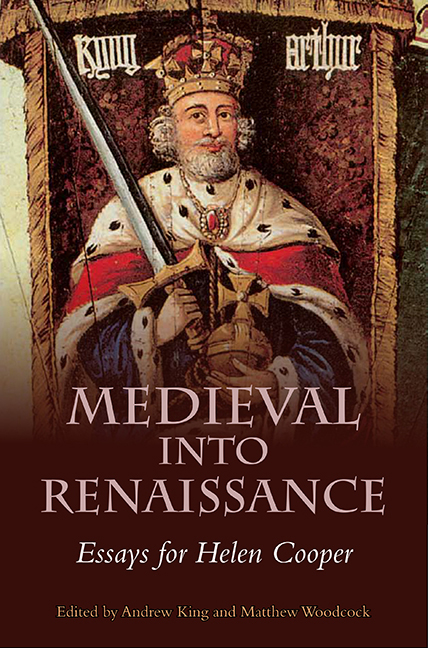Book contents
- Frontmatter
- Contents
- List of Illustrations
- List of Contributors
- Acknowledgments
- Abbreviations
- Introduction
- Unknowe, unkow, Vncovthe, uncouth: From Chaucer and Gower to Spenser and Milton
- Armour that doesn't work: An Anti-meme in Medieval and Renaissance Romance
- ‘Of his ffader spak he no thing’: Family Resemblance and Anxiety of Influence in Fifteenth-Century Prose Romance
- Writing Westwards: Medieval English Romances and their Early Modern Irish Audiences
- Penitential Romance after the Reformation
- The English Laureate in Time: John Skelton's Garland of Laurel
- Thomas Churchyard and the Medieval Complaint Tradition
- Placing Arcadia
- Fathers, Sons and Surrogates: Fatherly Advice in Hamlet
- ‘To visit the sick court’: Misogyny as Disease in Swetnam the Woman-Hater
- The Monument of Uncertainty: Sovereign and Literary Authority in Samuel Sheppard's The Faerie King
- Mopsa's Arcadia: Choice Flowers Gathered out of Sir Philip Sidney's Rare Garden into Eighteenth-Century Chapbooks
- Bibliography
- Index
- A Bibliography of Helen Cooper's Published Works
- Tabula Gratulatoria
The English Laureate in Time: John Skelton's Garland of Laurel
Published online by Cambridge University Press: 05 July 2016
- Frontmatter
- Contents
- List of Illustrations
- List of Contributors
- Acknowledgments
- Abbreviations
- Introduction
- Unknowe, unkow, Vncovthe, uncouth: From Chaucer and Gower to Spenser and Milton
- Armour that doesn't work: An Anti-meme in Medieval and Renaissance Romance
- ‘Of his ffader spak he no thing’: Family Resemblance and Anxiety of Influence in Fifteenth-Century Prose Romance
- Writing Westwards: Medieval English Romances and their Early Modern Irish Audiences
- Penitential Romance after the Reformation
- The English Laureate in Time: John Skelton's Garland of Laurel
- Thomas Churchyard and the Medieval Complaint Tradition
- Placing Arcadia
- Fathers, Sons and Surrogates: Fatherly Advice in Hamlet
- ‘To visit the sick court’: Misogyny as Disease in Swetnam the Woman-Hater
- The Monument of Uncertainty: Sovereign and Literary Authority in Samuel Sheppard's The Faerie King
- Mopsa's Arcadia: Choice Flowers Gathered out of Sir Philip Sidney's Rare Garden into Eighteenth-Century Chapbooks
- Bibliography
- Index
- A Bibliography of Helen Cooper's Published Works
- Tabula Gratulatoria
Summary
Skelton was writing on the cusp between the Middle Ages and the Renaissance, and almost all criticism of him grounds itself on a recognition of that transitional or ambiguous quality in him.
Helen Cooper, ‘Skeltonics’The poetry of John Skelton occupies an uneasy position in time. Unclaimed either by medievalists or by early modernists (or at least fervently claimed by neither), his canon has been relegated by contemporary periodisation to the no man's land between the late medieval and early modern periods. While aspects of his style and choices of genre recall medieval trends, his politically themed verse reflects the controversies of his own time, controversies in which he was sometimes personally embroiled. He claims to work in the mould of the great English poets of the medieval period – Chaucer, Gower, and Lydgate – while anticipating developments such as the fascination with fame and immortality that are often deemed characteristic of Renaissance verse. Consequently, he has come to be viewed, in the words of one critic, ‘as a transitional figure within modern accounts of literary history and periodization’.
Skelton's marginal position in time mirrors the shifting temporality that accompanies his preoccupation with his laureate status. In the prologue to his Eneydos (published in or around 1490), William Caxton describes ‘mayster John Skelton’ as ‘late created poete laureate in the unyversite of oxenforde’, a title he seems also to have received from the University of Louvain by 1492, and from the University of Cambridge in 1493. As Skelton's modern biographers have noted, these titles reflected an academic achievement in rhetoric rather than what early humanists or modern readers would understand by either ‘poet’ or ‘laureate’. Nevertheless, Skelton's oft-remarked reiteration of these titles throughout his corpus is indicative of his investment in them, an investment that Seth Lerer, among others, has argued borders on obsession. Moreover, as Skelton's most thoroughly laureate poem, The Garland of Laurel, demonstrates, his ambition seems to have been to imbue the purely academic title with all the classicised lustre associated with the title awarded to Francis Petrarch (1304–74), which – as Petrarch's own coronation address noted – linked laureate poets to the performance of a specific task: ‘the memorialization of the glory of those whom they serve’.
- Type
- Chapter
- Information
- Medieval into RenaissanceEssays for Helen Cooper, pp. 107 - 122Publisher: Boydell & BrewerPrint publication year: 2016

